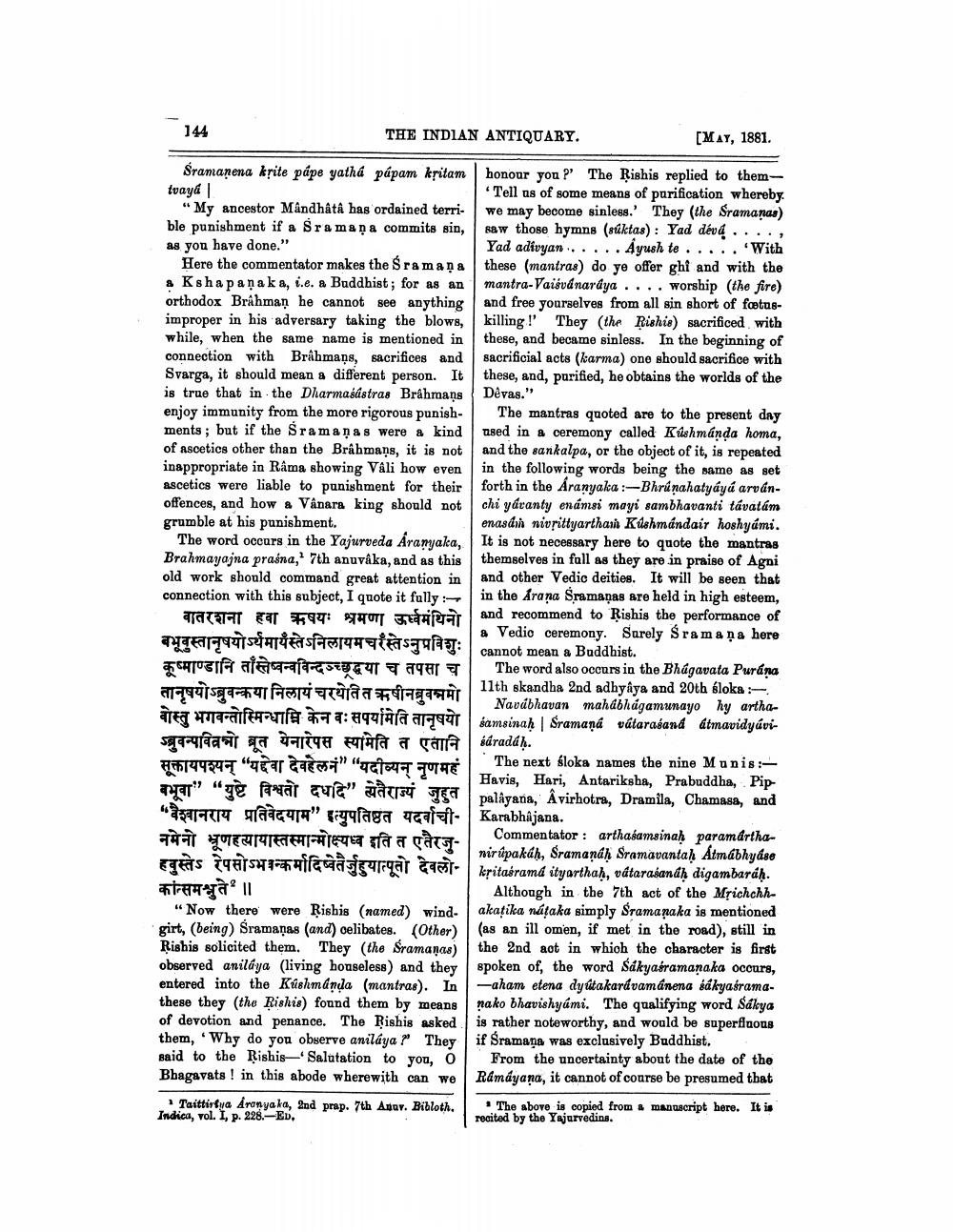________________
144
THE INDIAN ANTIQUARY.
MAY, 1881.
Sramanena ksite pápe yathá pápam kitam honour you?' The Rishis replied to themtvaya |
* Tell us of some means of purification whereby "My ancestor Mândhâtâ has ordained terri- we may become sinless. They (the Sramanas) ble punishment if a Sramana commits sin, saw those hymns (súktas) : Yad déve ...., as you have done."
Yad adivyan..... Ayush te ..... With Here the commentator makes the śramana these (mantras) do ye offer ghi and with the a Ksha paņaka, i.e. a Buddhist; for as an mantra-Vaišvánaraya . . . . worship (the fire) orthodox Brahman he cannot see anything and free yourselves from all sin short of fætusimproper in his adversary taking the blows, killing! They (the Rishis) sacrificed with while, when the same name is mentioned in these, and became sinless. In the beginning of connection with Brahmans, sacrifices and sacrificial acts (karma) one should sacrifice with Svarga, it should mean a different person. It these, and, purified, he obtains the worlds of the is true that in the Dharmasastras Brahmans
Dévas." enjoy immunity from the more rigorous punish- The mantras quoted are to the present day ments; but if the Sramaņas were & kind used in a ceremony called Kishmánda homa, of ascetics other than the Brahmans, it is not and the sarikalpa, or the object of it, is repeated inappropriate in Rama showing Vâli how even in the following words being the same as set ascetics were liable to punishment for their forth in the Aranyaka :-Bhrinahatyáyá arvanoffences, and how & Vânara king should not | chi ydranty enámsi mayi sambhavanti távatám grumble at his punishment.
enasáin nivsittyarthani Kushmándair hoshyámi. The word occurs in the Yajurveda Aranyaka, It is not necessary here to quote the mantras Brahmayajna prašna,' 7th anuvâka, and as this themselves in fall as they are in praise of Agni old work should command great attention in and other Vedic deities. It will be seen that connection with this subject, I quote it fully in the Arana Sramaņas are held in high esteem, वातरशना हवा ऋषयः श्रमणा उर्वमंथिनो
and recommend to Rishis the performance of
a Vedio ceremony. Sarely Śramaņa here बभूवुस्तानृषयोय॑मायस्तेनिलायमचरस्तेऽनुपविशुः
cannot mean a Buddhist. कूष्माण्डानि ताँस्लेष्वन्वविन्दञ्च्छ्रद्धया च तपसा च The word also occurs in the Bhagavata Purána
11th skandha 2nd adhyâya and 20th sloka -
Navábhavan mahábhágamunayo hy arthaवोस्तु भगवन्तोस्मिन्धानि केन वः सपर्यामेति तानुषयो
samsinah Sramañá vátarasand atmavidyúviब्रुवन्पवित्रन्नो ब्रूत येनारेपस स्यामेति त एतानि sáradaḥ. सूक्तायपश्यन् “यद्देवा देवहेलनं" "यदीव्यन् नणमहं
The next sloka names the nine Monis:
Havis, Hari, Antariksha, Prabuddha, Pipबभूवा" "युष्टे विश्वतो दधदि" येतैराज्यं जुहुत
palâyata, Âvirhotra, Dramila, Chamasa, and "वैश्वानराय प्रतिवेदयाम" इत्युपतिष्ठत यदर्वाची. Karabhîjana. नमेनो भ्रूणहत्यायास्तस्मान्मोक्ष्यध्व इति त एतैरजु
Commentator: arthasamsinah paramartha
mirúpakah, Sramanah Sramavantah Atmábhydse हस्तेऽ रेपसोऽभवन्कर्मादिष्वेतर्जुहुयात्पूतो देवलो
kritasramdityarthaḥ, vátarasandh digambaráh. tha 11
Although in the 7th act of the Msichchh"Now there were Rishis (named) wind- | akatika nitaka simply Sramanaka is mentioned girt, (being) Śramaņas (and) celibates. (Other) (as an ill omen, if met in the road), still in Rishis solicited them. They (the Sramaņas) the 2nd act in which the character is first observed anilaya (living houseless) and they spoken of, the word Śákyasramanaka occurs, entered into the Kushmanda (mantras). In -aham etena dytakarávamánena bdkyasramathese they (the Rishis) found them by means nako bhavishyámi. The qualifying word Sakya of devotion and penance. The Rishis asked is rather noteworthy, and would be superfluous them, "Why do you observe aniláya ?" They if Sramana was exclusively Buddhist. said to the Rishis Salutation to you, O From the uncertainty about the date of the Bhagavats ! in this abode wherewith can we | Ramayana, it cannot of course be presumed that
Taittireya Aranyaka, 2nd prap. 7th Aguv. Bibloth. The above is copied from a manuscript here. It is Indica, vol. I, p. 228.-ED.
recited by the Yajurvedins.
तानृषयोऽब्रुवन्क्रया निलायंचरयोतित ऋषीनब्रुवन्नमो |




